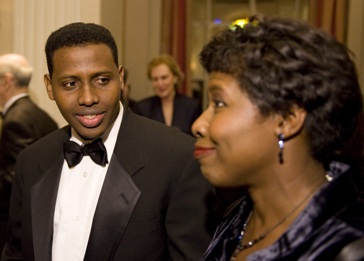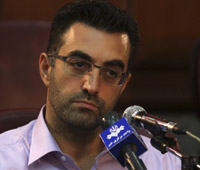
Meeting in the Roosevelt Room on Human Rights Day
Did you miss it? Yesterday was the 61st anniversary of the United Nation General Assembly’s adoption of the Universal Declaration of Human Rights. President Barack Obama, as he was leaving for Oslo to accept the Nobel Peace Prize, declared December 10 Human Rights Day. To help mark it, his national security advisor, the retired Marine General James L. Jones, at…

An Iraqi in America: In the middle of nowhere
We are all stuck in the middle of nowhere. Millions in Iraq and millions outside it face an ambiguous future. Hundreds of thousands of Iraqis fled Iraq under Saddam’s regime, which lasted for almost 40 years, but since the led-American invasion in 2003 that number has exceeded 4 million, according to United Nations estimates.
Letter to Ahmadinejad: Release the hikers
I hope Iran’s President Mahmoud Ahmadinejad checked his fax machine this morning because he received an important letter urging the release of three American hikers held now for five months without charge. I joined 79 signatories from a dozen countries in signing the appeal because I am gravely concerned that the hikers are being used as political…
Morocco silences the pens of its journalists
On the eve of Hillary Clinton’s departure to Morocco for the Forum of the Future on November 3, CPJ urged her to “impress upon the Moroccan authorities that a free press is a crucial component of any free society.” The forum is a gathering of political, business, and social leaders from the Middle East and…

Seen and heard at CPJ benefit: ‘The pen is not broken’
Small in stature but strong in her words, Naziha Réjiba tells a reporter of all the things the Tunisian government does to try to frighten her. But Réjiba said that she will not be scared, that she will never allow such tactics to have power over her. Editor of Kalima, an online news Web site blocked in…

Maziar Bahari, Iran, and the impact of world pressure
Maziar Bahari’s chilling account of his 118 days in an Iranian prison is the cover story of Newsweek this week. Bahari, a renowned journalist and documentary filmmaker, was arrested soon after the disputed June 12 elections. While in prison, he was subjected to psychological and physical abuse. His captors wanted to convince him that he…
A letter to the American hikers being held in Iran
The families of Shane Bauer, Josh Fattal, and Sarah Shourd, the three hikers detained in Iran, said today they are concerned about their children’s emotional well-being after nearly four months in prison. They asked supporters to send letters, which they will seek to deliver to them in Evin Prison in Tehran, where the three are…
Free Speech Protection Act could slow ‘libel tourism’
Free press advocates in Britain are looking to a bill stuck in the U.S. Congress for moral support in the fight to reform England’s draconian defamation laws. The U.S. bill, the Free Speech Protection Act 2009, is itself the product of those laws, which have made London the capital of “libel tourism.”
Toronto’s Citizen Lab uses forensics to fight online censors
A basement in the gray, Gothic heart of the University of Toronto is home to the CSI of cyberspace. “We are doing free expression forensics,” says Ronald Deibert, director of the Citizen Lab, based at the Munk Centre for International Studies. Deibert and his team of academics and students investigate in real time governments and…

Just off Freedom Square in Yemen
Swathed in the traditional black face veil, or niqab, Yemeni women brandish banners with images of disappeared and imprisoned journalists. Every Tuesday, in Yemen’s capital city of Sana’a, Tawakul Karman, chairwoman of Women Journalists Without Chains (WJWC), leads these women into Freedom Square to demonstrate.